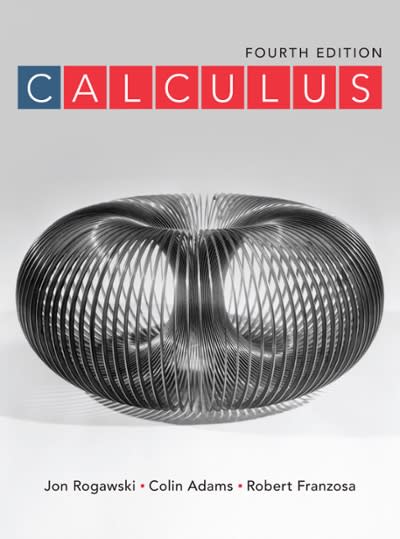Suppose that Q(x) = (x a)(x b), where a b, and let P/Q be
Question:
Suppose that Q(x) = (x − a)(x − b), where a ≠ b, and let P/Q be a proper rational function so that

(a) Show that 
(b) Use this result to find the partial fraction decomposition for P(x) = 3x − 2 and Q(x) = x2 − 4x − 12.
Transcribed Image Text:
P(x) Q(x) A (x-a) + B (x-b)
Fantastic news! We've Found the answer you've been seeking!
Step by Step Answer:
Answer rating: 100% (2 reviews)
a Clearing denominators gives us Setting x a then yields while setting x b yields therefore ...View the full answer

Answered By

Muhammad Umair
I have done job as Embedded System Engineer for just four months but after it i have decided to open my own lab and to work on projects that i can launch my own product in market. I work on different softwares like Proteus, Mikroc to program Embedded Systems. My basic work is on Embedded Systems. I have skills in Autocad, Proteus, C++, C programming and i love to share these skills to other to enhance my knowledge too.
3.50+
1+ Reviews
10+ Question Solved
Related Book For 

Question Posted:
Students also viewed these Mathematics questions
-
A first step to checking the ADA accessibility of your site may be to: Remove all small type from the site Purchase a site that claims to be ADA compliant Ask your website provider about current...
-
The process of adding rational functions (ratios of polynomials) by placing them over a common denominator is the analogue of adding rational numbers. The reverse process of taking a rational...
-
The process of adding rational functions (ratios of polynomials) by placing them over a common denominator is the analogue of adding rational numbers. The reverse process of taking a rational...
-
The following table includes the GNP(X) and the demand for food (Y) for a country over ten years period. Year 1980 1981 1982 1983 1984 1985 1986 1987 1988 1989 Y 6 7 8 10 8 9 10 9 11 10 X 455555 50...
-
Candice Hargrove, the accountant, is a perfectionist. No one can do the job as well as she can. Indeed, she has found budget information provided by the various departments to be worthless. She must...
-
The graduate Management Admission Test (gMAT) is a standardized exam used by many universities as part of the assessment for admission to graduate study in business. The average gMAT score is 547...
-
What two strategic actions are used in implementing the renewal strategies? LO1
-
What marketing recommendations, including pricing recommendations, would you make to Southwest as it moves into the next decade? Its the same plane going to the same place at exactly the same time....
-
Panther Corporation uses the weighted-average method in its process costing system. Data concerning the first processing department for the most recent month are listed below: Beginning work in...
-
Prove the general formula where a, b are constants such that a b. dx (x-a)(x - b) S 1 In a-b x-al + C x-b|
-
Use the substitution of Exercise 57 to evaluate d/cos + sin . Data From Exercise 57 Show that the substitution = 2 tan 1 t (Figure 2) yields the formulas This substitution transforms the integral...
-
From the information given in Activity 11.4 (a) for Company F, calculate the fixed overhead volume variance for Company F for November.
-
2.11.2Project:Performance Task: The Parallax Problem Project Geometry Sem 1 (S3537251) Julio Duenas Points possible:120 Date: ____________ The Scenario:You're looking for a sponsor to pay for you to...
-
If the most common treatment of assigning overapplied overhead was used, the final balance in Cost of Goods Sold would have been * (1 Point) At the end of the last fiscal year, BREAD Company had the...
-
Angelina received new word processing software for her birthday. She also received a cheque with which she intends to purchase a new computer. Angelina's UNILUS Professor assigned a paper due in two...
-
At date t, the portfolio P to be hedged is a portfolio of Treasury bonds with various possible maturities. Its characteristics are as follows: Value YTM MD Convexity $1,450 6% 4.25 55 We consider...
-
A playground merry-go-round with an axis at the center (radius R = 1.3 m and rotational inertia | = 1.2 x 103 kgm2) is initially rotating at angular velocity w = 0.21 rad/s clockwise). A girl of mass...
-
In problems, find each integral. (a) « e3x+1 dx (b) (c) xedx (x3)e6xdx
-
Tell whether the angles or sides are corresponding angles, corresponding sides, or neither. AC and JK
-
True or False Every polynomial function of degree 3 with real coefficients has exactly three real zeros.
-
If r is a real zero of even multiplicity of a function f, then the graph of f _______ (crosses/touches) the x-axis at r.
-
In problem, use the graph of the function f to solve the inequality. (a) f(x) > 0 (b) f(x) ¤ 0 3 y = 1 3 4 5 x -4 -3 -2 -2 x= 2 X=-1
-
Comfort Golf Products is considering whether to upgrade its equipment Managers are considering two options. Equipment manufactured by Stenback Inc. costs $1,000,000 and will last five years and have...
-
Weaver Corporation had the following stock issued and outstanding at January 1, Year 1: 71,000 shares of $10 par common stock. 8,500 shares of $60 par, 6 percent, noncumulative preferred stock. On...
-
Read the following case and then answer questions On 1 January 2016 a company purchased a machine at a cost of $3,000. Its useful life is estimated to be 10 years and then it has a residual value of...

Study smarter with the SolutionInn App


